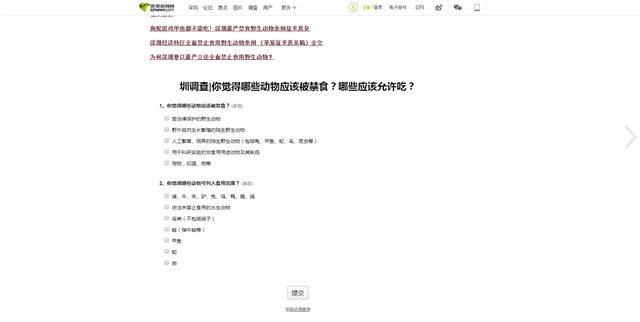In a nationwide campaign against some Chinese people's game meat consumption, Shenzhen City, in southern China's Guangdong Province, became one of the first places across the country to act.
State legislators on February 24 issued a decision to ban the illegal trade of wild animals and the habit of eating them, making exceptions only for animals that are listed in the livestock and poultry list. That list is being renewed.
The next day, Shenzhen's legislators released to the public a draft document on banning the consumption of wild animals within the city and started to hear what residents had to say.
The draft bans the eating of all animals within the city except for nine categorized as livestock and poultry: pigs, cattle, sheep, donkeys, rabbits, chickens, ducks, geese, pigeons. Violations come with a fine of at least 1,000 yuan (about 144 U.S. dollars).
In order to gather public opinion, questionnaires were put online and on social media.
Considering Guangdong Province is one of the largest markets in the country for game meat, the draft stirred up a reaction among residents, who have been eating local delicacies like bullfrogs, soft-shelled turtles and snakes since ancient times, and would not be allowed to continue the practice according the draft. Many could not keep silent.
On the popular Chinese social media platform Weibo, people have been posting comments of both approval and confusion.
In a survey, which pays special attention to certain animals that are quite popular on Shenzhen people's dining tables, carried on Shenzhen news websites like sznews.com, participants are asked two multiple choice questions:
1. Which animals do you think people should be banned from eating?
A. Legally protected wild animals
B. Terrestrial wild animals that live in the wild
C. Terrestrial wild animals that are bred artificially (including turtles, soft-shelled turtles, snakes, birds, insects, etc.)
D. Animals and animal products that are used for purposes other than eating, for example, scientific experiments
E. Pets, for example, cats and dogs.
2. Which animals do you think people should be allowed to eat?
A. Pigs, cattle, sheep, donkey, rabbits, chickens, ducks, geese, pigeons
B. Aquatic animals that are not on the ban list
C. Birds (pigeons excluded)
D. Frogs (bullfrogs and others)
E. Soft-shelled turtles
F. Snakes
G. Dogs

According to local newspaper Shenzhen Special Zone Daily, by Friday, over 10,000 people had taken part in the online survey and most of them wanted bullfrogs and soft-shelled turtles off the ban list.
At the same time, some restaurants in Shenzhen said that the ban would put them in a very difficult position and even bankruptcy. Some of them are already suffering from a temporary shutdown after the nationwide ban.
Wang Guohui, head of Rongji, a very popular chain restaurant in Shenzhen that specializes in snake meat and has over 50 branches in Guangdong alone, said if the draft comes into effect, it would be devastating for his business.
Luo Qing, founder of frog meat restaurant Walaida, said that Shenzhen has thousands of frog meat restaurants that employ over 100,000 people, and the impact could be serious.
In addition to questionnaires, local authorities in Shenzhen have received over 2,000 emails from individuals and organizations.
In her email, Zhang Xiya, a volunteer that has been engaged in animal protection for years, voiced her support for the draft, but she also drew attention to pets like cats and dogs, suggesting a complete ban on eating them.
Zhang Yuanyuan, China director of Act Asia, a Guangdong-based NGO dedicated to environment and animal protection, pointed out the risks of breeding soft-shelled turtles, especially the possibility of causing Vibrio cholera, citing scientific studies.
One day before Shenzhen finished its public opinion gathering, on March 4, the Ministry of Agriculture and Rural Affairs announced that bullfrogs and soft-shelled turtles are off the ban list.
Shenzhen's legislators responded by saying that the city's ban list will not go beyond the nation's.
The draft will be submitted for legislators' deliberation this week.
Following Shenzhen, Guangzhou, the capital city of Guangdong, also released a draft ban to the public and has started to gather opinions.




